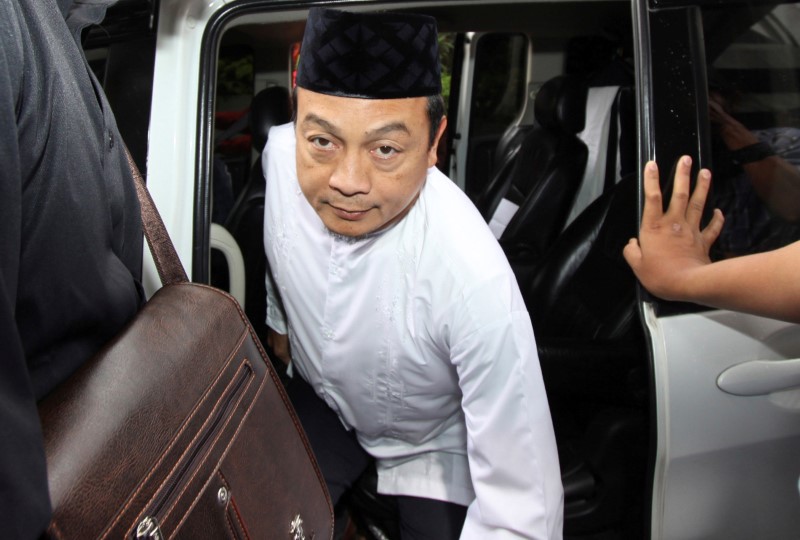
By Tom Allard and Agustinus Beo Da Costa
JAKARTA (Reuters) – The leader of a powerful Indonesian Islamist organization that led the push to jail Jakarta’s Christian governor has laid out plans for a new, racially charged campaign targeting economic inequality and foreign investment.
In a rare interview, Bachtiar Nasir said the wealth of Indonesia’s ethnic Chinese minority was a problem and advocated an affirmative action program for native Indonesians, comments that could stoke tensions already running high in the world’s largest Muslim-majority nation.
“It seems they do not become more generous, more fair,” the cleric said, referring to Chinese Indonesians, in the interview in an Islamic center in South Jakarta. “That’s the biggest problem.”
Ethnic Chinese make up less than 5 percent of Indonesia’s population, but they control many of its large conglomerates and much of its wealth.
Nasir also said also that foreign investment, especially investment from China, has not helped Indonesians in general.
Indonesia, Southeast Asia’s biggest economy, is a major destination for foreign investment in the mining and retail sectors. Jakarta is also trying to lure investors for a $450 billion infrastructure drive to revive economic growth.
“Our next job is economic sovereignty, economic inequality,” said Nasir, an influential figure who chairs the National Movement to Safeguard the Fatwas of the Indonesian Ulemas Council (GNPF-MUI). “The state should ensure that it does not sell Indonesia to foreigners, especially China.”
His group organized protests by hundreds of thousands of Muslims in Jakarta late last year over a comment about the Koran made by the capital’s governor, Basuki Tjahaja Purnama, an ethnic-Chinese Christian.
Purnama was found guilty this week of blasphemy and sentenced to two years in prison, raising concerns that belligerent hardline Islamists are a growing threat to racial and religious harmony in this secular state.
Nasir, 49, used to have a late-night religious show on one of Indonesia’s biggest TV networks. His contract was ended under government pressure after his role in the first anti-Purnama rally was revealed.
He spoke calmly during the interview, identifying other religiously motivated objectives such as restricting alcohol to tourist areas, curbing prostitution and criminalizing adultery and sodomy. He insisted he believes in a pluralist Indonesia.
“PLAYING WITH FIRE”
Former President Suharto blocked Chinese Indonesians from many public posts and denied them cultural expression, forcing them to drop their Chinese names. Marginalized politically and socially, many turned to business and became wealthy.
The ethnic wealth gap has long fed resentment among poorer “pribumi”, Indonesia’s mostly ethnic-Malay indigenous people. During riots that led to the fall of Suharto in 1998, ethnic-Chinese and Chinese-owned businesses were targeted, and about 1,000 people were killed in the violence.
There has been no blood-letting on that scale since then, but tensions have remained. President Joko Widodo was the subject of a smear campaign on the campaign trail in 2014 that falsely claimed he was a Chinese descendant and a Christian.
Bonnie Triyana, a historian who has chronicled Chinese Indonesian experiences, said Nasir was “scapegoating” the Chinese.
“It’s very dangerous for our nation. It’s playing with fire,” said Triyana, who is an indigenous Indonesian. “They are spreading bad information to convince people that their role is to save the nation.”
In the interview, Nasir said “ethnic sentiment cannot be denied” when it comes to inequality, and the economic power of Chinese Indonesians needs to be addressed.
“The key is justice, and taking sides,” he said. “Justice can be applied if there is a preferential option for indigenous Indonesians from a regulation aspect and in terms of access to capital.”
Neighboring Malaysia, also a Muslim-majority nation with a wealthy Chinese minority, has long followed affirmative action policies that grant native Malays privileges, including job reservations in the civil service and discounts on property.
Johan Budi, a spokesman for Indonesian President Widodo – responding to Bachtiar’s comments – said in a statement to Reuters that income inequality is high on the government agenda and Indonesian Chinese get no special treatment.
“It is not true this allegation that President Jokowi gives wider space to ethnic Chinese in Indonesia,” Budi said, referring to Widodo by his nickname. He said Widodo’s focus is on the poor, including “indigenous people”.
According to the Credit Suisse Research Institute’s 2016 Global Wealth Report, the top 1 percent wealthiest Indonesians owned 49.3 percent of national wealth, making it among the most unequal nations in the world.
LINK TO POLITICS?
A Saudi-trained cleric, Nasir formed the GNPF-MUI last year to target Purnama, the now-convicted Jakarta governor.
Although Nasir is not as visible as the firebrand radical cleric Habib Rizieq who led last year’s protests, his group carries significant clout because it brings under one umbrella Islamist organizations that have national reach and strong links with mosques and religious schools.
GNPF-MUI includes Salafist intellectuals like Nasir, Rizieq’s Islamic Defenders Front and their urban poor constituency, along with middle class and politically connected Islamic groups.
Nasir said GNPF-MUI is a “religions movement”, not political. However, he is widely seen as allied to opposition leader Prabowo Subianto, who lost to Widodo in the 2014 election and could be a candidate for the presidency in 2019.
Greg Fealy, an expert on Indonesian Islamic groups from the Australian National University, said GNPF-MUI is developing a national agenda following the Jakarta governor’s conviction.
“They are trying to harness that movement to link the Islamist agenda with inequality. It is, in effect, targeting Chinese non-Muslims,” he said. “This is all part of a pitched battle in the run-up to 2019.”
(Edited by John Chalmers and Raju Gopalakrishnan)




